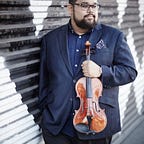Walking through the door
Sometimes, without knowing it, we open a door for our future selves. At the time, we can’t really imagine what it will be like on the other side — in fact, it may be utterly terrifying. At the time, all we can do is utter a quick prayer and keep moving.
Today, 11 years ago, I gave my first TED talk. I was 22. I had never given a talk in public before. I was terrified.
At the time, I didn’t have a writing practice. During the 2009 holidays, I remember exchanging frantic emails with the TED curator who stressed that the talk had to be *exactly* 5 minutes. I imagined a humiliating candy-striped hook coming to pull me offstage if I went over time. I got to work, counting down the weeks, writing and rewriting my incoherent hopes for a talk into some meaningful shape. I watched every TED talk I could find, awestruck by the way certain speakers could weave a spellbinding, heartfelt, stunning talk in an eye-blink. I taped sheets of white printer paper to the wall above my bed, a pen close by to jot down thoughts if they came in my dreams, or first thing in the morning. I punctuated every free moment of my life in 5-minute segments: a 40 minute drive meant I got 8 tries; a 15 minute intermission of a rehearsal or concert — just 3. In just the week leading up to the talk, I must have practiced my 5 minute talk 100 times.
How could I form all of my complicated thoughts and feelings about making music between Skid Row and Disney Hall, about the gut-punch of my first encounters with the largest homeless community in America, about the seemingly irreconcilable disparities in my new home city — into *exactly 5 minutes*? How could I possibly talk about how I was realizing — just two years into winning a “dream job” in a top American orchestra — that I was living someone else’s dream? How could I begin to talk about what I hadn’t yet understood — that it was an entire community in Skid Row who was teaching *me* lessons of humanity and healing, not the other way around?
So I left it all out. Watching this talk now, finally able to forgive that over-rehearsed, pontificating tone, my foppish stage prowl — I’m struck by how much I left out, how much was left unsaid. I realize now that I was opening a door for myself. I was envisioning a world to come: a life of asking incessant, inconvenient questions about the role of art in society; a life of creating belonging through music, a healing bridge between fractured worlds.
In February 2011, when I returned to TED the following year, I started Street Symphony. Later that year, I started speaking at every TED or TEDx conference I could get to, where folks asked me to share “the-music-is-medicine” talk. Eventually, my friends at The Lavin Agency found a way for me to share this growing, shifting story with companies and educators and nonprofits and communities across the US and Canada. Speaking became, as it is now, a part of my life and my craft — a way to weave multiple histories, narratives and gifts into a conversation with passionately curious people.
Now, I leave less of myself out of my talks.
Right before I went on stage to deliver this TED talk, carefully walking down the steps of the dark auditorium in a wrinkled shirt, unfortunate blazer and polished shoes, I mentally tossed out my outlines and frantic rehearsing. I don’t know why. Somehow, I entered into a moment of total surrender: walking down the steps of the audience of that little theatre in Long Beach, I muttered an unintended, childhood prayer to Saraswati under my breath, the goddess of wisdom and learning and music, the goddess my ancestors called “Vag-Devi” — the goddess of speech who sits upon the tongue of poets — the goddess who has opened every door of my life.
Somehow, in that moment, I knew I was carefully walking through a door that would change my life.
(I went 15 seconds over my allotted time. But it was worth it.)
